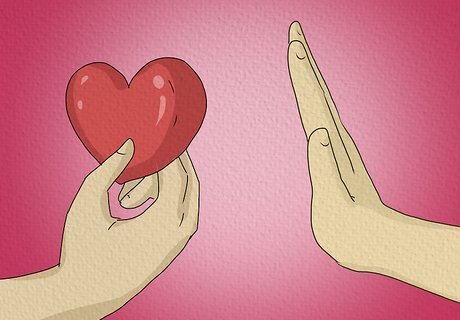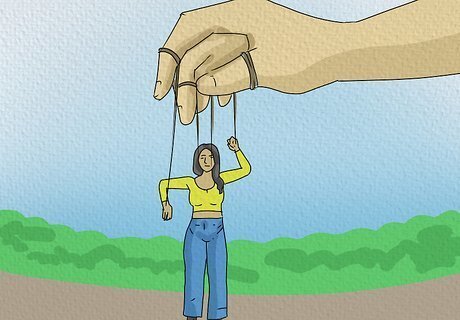
views
- Narcissists require a lot of attention and flattery to be satisfied. If they think you're not giving them preferential treatment, then they'll look for other admirers.
- Narcissists may love bomb—shower you with praise, gifts, and affection—in the beginning of the relationship so you get "hooked" on them.
- Many narcissists avoid monogamy because this relationship style prevents them from flirting with others and getting more "supply" to feed their egos.
- With enough self-awareness and therapy, narcissists can actually change and learn to be genuinely empathetic, compassionate, and caring.
Is it possible for a narcissist to be faithful?

Unfortunately, it’s unlikely that a narcissist will ever be faithful. A narcissist prioritizes themselves above all other people, and they need an almost endless supply of attention, flattery, and preferential treatment to maintain their self-image. If a narcissist believes that you’re not placing them on a pedestal anymore, then they’ll walk outside the bounds of a relationship to find someone else who will cater to them. Covert narcissists—narcissists who are more introverted and insecure—may be just as unfaithful as an overt narcissist due to their need for attention. Covert narcissists are also likely to engage in multiple relationships to soothe their egos. It's possible for a narcissist to be faithful if they feel that fidelity best serves their interests.
Reasons a Narcissist Is Unfaithful

A narcissist is highly self-centered. They’re unlikely to ever truly prioritize you. There may be a short period of time when the narcissist pretends that you’re the center of their universe. However, don’t be deceived: this is just a control tactic so you’ll get hooked on them. Typically, the only person a narcissist truly cares about is themselves. If your needs are “pesky” or inconvenient, they’ll have no problem brushing them aside in favor of what they want. For example, a narcissist might “love bomb”—shower you with praise and attention—during your first dates. However, if you make a request later down the line, such as asking them to come to a family dinner, they might call you “needy” and “inconsiderate” of their time. A narcissist may also focus solely on their needs, even at your own expense. If you two are splitting rent, they might not fulfill their end of the bargain and instead spend money lavishly. They might then claim they needed some “retail therapy.”

A narcissist doesn’t want to be tied down. They usually want a lot of admirers at their beck and call. Unlike a healthy individual who loves and embraces themselves, a narcissist doesn’t feel powerful and in control unless they’re stringing a lot of people along. They enjoy conquest and finding new “targets,” so they’re not likely to be satisfied with just one romantic partner. However, they probably will enjoy making you jealous, so they’ll agree to date you while seeing what their “options” are. Narcissists are often really showy about all the attention they get. They might feign annoyance when they get texts from an ex and say something like, “It’s so sad. They’re so obsessed with me!” You might, however, notice them smirk when they share this information. They like to “play the field” so they can get their supply. The more people that they wrangle in, the more they get the validation they seek and feed off of.

A narcissist doesn’t like to form emotional attachments. They find it tedious to invest energy in people. The common refrain for a narcissist is “me, me, me!” They’re all about what they can get from another person, and thrive off of attention, compliments, and approval. Unfortunately, they’re not concerned with reciprocity. It simply doesn’t occur to them to think about what you might need. For a narcissist, any amount of effort they have to put into a relationship seems like a waste of time. They often believe that a dynamic should just be “easy," and if it starts to become inconvenient, then they’ll be on the lookout for a new target. Narcissists also fail to form emotional attachments because they see people as interchangeable. Since they don’t see people as unique and special, they can’t really commit to any one individual.

A narcissist lacks empathy for other people. They're only focused on how to get their own needs met and they don't consider other people's emotions. No matter how many times you explain yourself or try to describe how you feel, they probably won’t feel a shred of compassion or remorse. Instead, they might resent you for speaking up about your emotions or setting boundaries. For example, if they openly flirted with one of their friends, you might divulge, “I felt really insecure and undervalued when you did that. Can you please stop encouraging them?,” they might lash out at you and call you “dramatic.”

A narcissist doesn’t believe in self-control. If they’re interested in someone, then they’ll jump at the chance to charm them. A narcissist doesn't have any inhibitions. They also don’t see anyone as “off-limits,” which means that they may pursue your friends and even your relatives. Since narcissists don’t have a strong sense of consequences, they’ll get into all sorts of entanglements, even if they’re messy and create complications. In fact, a narcissist might like all the drama that results from their behavior. Ultimately, narcissists like to get a reaction out of you because it makes them feel that they have power over you.

A narcissist doesn’t place a high value on commitment. They don’t want to be held accountable to rules or standards. A narcissist believes they should have the relationship they want, so if they don’t want to settle down, then they simply won’t. In their eyes, the idea of commitment is stifling. Not only that—choosing just one person keeps them from playing games with other people’s hearts. For a narcissist, the ideal dynamic is one where you don’t have any boundaries so they can act as they please. If you mention that you want a monogamous relationship, a narcissist might originally agree to it. However, as soon as another love interest crops up, they’re likely to pursue it without checking in with you. A narcissist might also berate you for asking for a relationship style that’s conventional and that doesn’t give them the opportunity to “play.”

A narcissist has a huge sense of entitlement. They believe they “deserve” anything they want, including an affair. A narcissist believes that they’re the most significant person in a relationship (in fact, they believe they’re the most important individual in any circumstance). If they feel tempted or enticed by anyone, a narcissist will think that they’re justified in stepping outside of their commitments. A narcissist only thinks about what they can gain in a situation, even if they’ll break your heart in the process. They might claim that they couldn’t resist an affair and that they needed it because you weren’t showing them enough attention.

A narcissist enjoys manipulating others. They’ll play with people’s emotions and “love bomb” them. You’re not the only person that a narcissist will lavish with praise and affection. Ultimately, narcissists love the honeymoon stage of relationships, when everything is fresh and special, and, most importantly, when they look “perfect” in someone’s eyes. They’ll woo as many people as possible so they can get their “supply” and lead on multiple admirers. A narcissist might “hoover”—slyly come back into the lives—of their exes, as well. You might catch them texting or DMing someone they told you they ended things with. If you do, chances are that they’re trying to impress and win over this person. Narcissists also thrive on drama, so if their behavior makes you feel insecure and uncertain, then they’ll keep repeating the same toxic patterns.

A narcissist is insecure and fears rejection. They’ll want approval from multiple love interests to feed their ego. However, not everyone falls for a narcissist’s tricks; in fact, some people will get tired of the games and go “no contact” by ending all communication. This tactic will definitely wound a narcissist’s ego, so they’ll “recover” by finding new targets. Even if you give them all your love and attention, it simply won’t be enough to satisfy a narcissist.
Can a narcissist truly love someone?

People with Narcissistic Personality Disorder don't selflessly love. If you want a partner who puts their needs aside to honor yours, then the sad news is that a true narcissist can't provide that type of connection. Narcissists can show affection and care, but they use these tactics in order to use and exploit others. A narcissist only has one true love: themselves. Bear in mind that only 0.5%-5% of adults in the U.S. are diagnosed with Narcissistic Personality Disorder (NPD), so it's uncommon to run into an actual narcissist. Someone you're dating might have some narcissistic personality traits without actually having NPD. If that's the case, then it's very likely that they're capable of demonstrating true love.
Can a narcissist ever change?

Narcissists can change if they're willing to seek professional help. Usually, narcissists are only motivated to go to therapy and alter their behavior if they've hit rock bottom. There may come a time in their life where their manipulative tendencies have driven everyone away, so they're forced to evaluate themselves and the consequences of their actions. With enough counseling and commitment to self-awareness, a narcissist can develop empathy, care, and compassion for others. If they receive enough mental health support, it's even possible to have a good relationship with a narcissist.
How do I know when a narcissist is cheating?

Cancelled plans and social media flirtations are potential signs of infidelity. When it comes to infidelity, a narcissist might actually want to hurt you just to get their own needs met. If they feel they're not getting enough attention, they'll act out by finding a new love interest. They may even gaslight you—confuse you and make you question reality—for the sense of power it gives them. For example, they might say they had an affair because you're too flirty with your friends (even if you aren't). Common signs of unfaithfulness include: Making grand claims in the beginning of a relationship that they'd never cheat Canceling plans and going "MIA" without any heads up or communication Creating love triangles with exes, friends, and admirers Using social media to flirt and hiding their online activity from you A string of short-lived relationships Complaints about infidelity and abuse from former flames A pattern of chronic lying




















Comments
0 comment